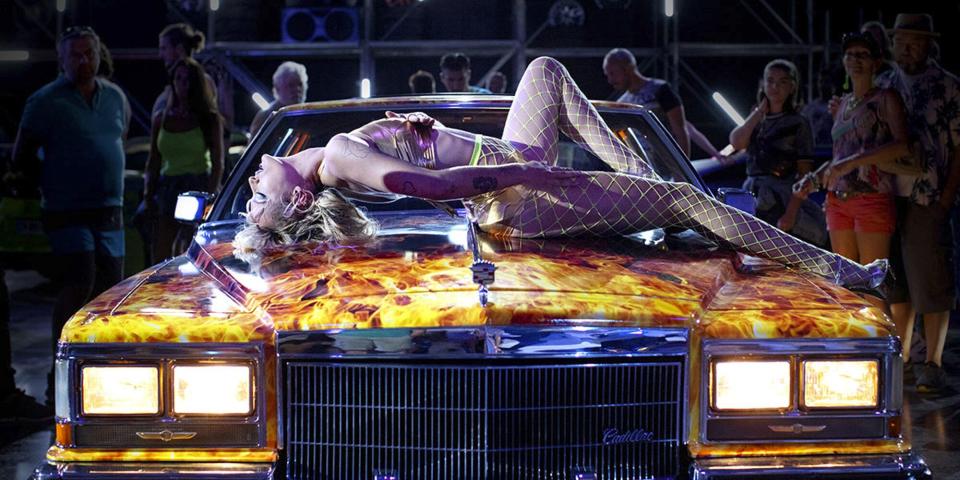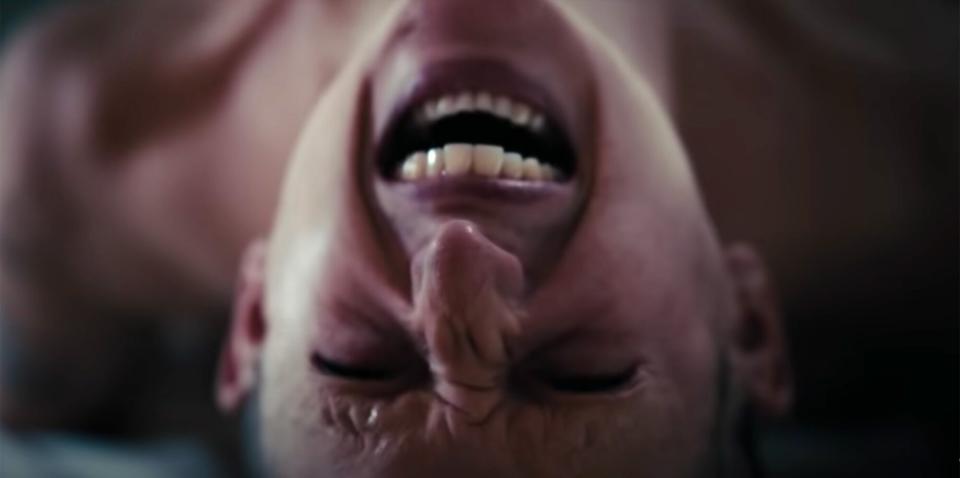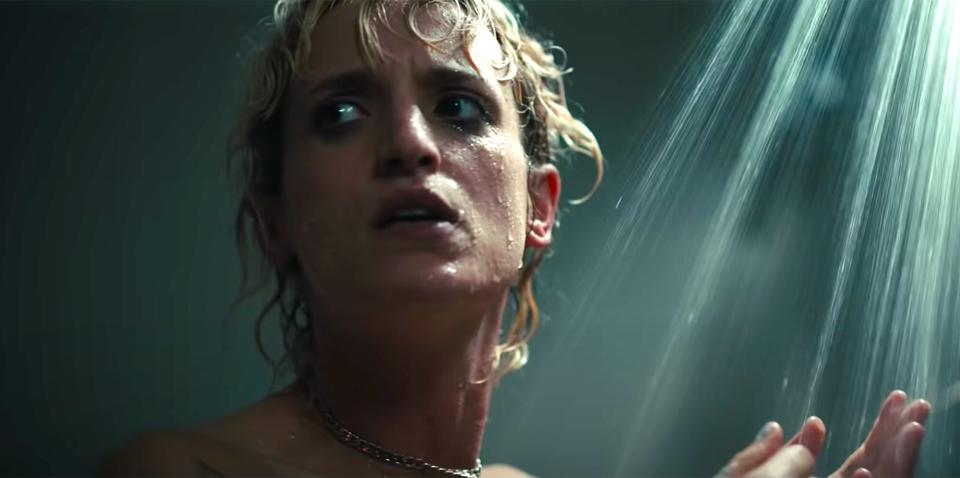Titane director reveals how she made a 'monstrous' metal car baby via car sex
- Oops!Something went wrong.Please try again later.
Warning: This article contains spoilers about Julia Ducournau's new movie Titane.
There's no mincing of words in Julia Ducournau's analysis of her history-making, Palme d'Or-winning masterpiece Titane — a film that could've registered as a farce in less capable hands.
"My character is not real, you realize that?" she stresses to EW of her focal character, Alexia (Agathe Rousselle), a serial killer whose metallic skull implant gives her an insatiable desire to have sex with automobiles. "All this is logical in the narrative and in the world I created. I mean, we're talking about someone who's impregnated by a car."
Car sex, as it goes, leads to car babies and other natural bodily functions slathered in body-horror sheen: Alexia lactates oil, rips skin off of her ballooning stomach to reveal chrome flesh underneath, and more, all before she crosses paths with a grieving father (Vincent Lindon) who warms her heart. "Obviously," Ducournau says, "there are different expectations as far as the pregnancy is concerned. You don't need to go and find a political agenda behind that!"
But, a practical agenda, there was! Ahead, Ducournau breaks down how — and, thematically, why — she conceived of Titane's wildest moments, from the look and feel of her "monstrous" car baby to the interCARse that produced it.

Courtesy of TIFF Agathe Rousselle straddles a car in 'Titane.'
Consent is vital between woman and car
Titane began and ended, in Ducournau's mind, with the car baby's birth. It was the first scene she saw when she sat down to write the film, and she knew she had to lay the foundation right. Of the 11 drafts she wrote, the sex scene between Alexia and a classic muscle car remained the same in each version of the script, and for good reason.
"The idea was to make you believe there was a seduction going on between her and the car, that there was a complicity between them, that we'd see it as a sex scene involving two consenting figures: her and the car, and that both of them were together," she says of the scene, which sees Alexia meeting the vehicle in a warehouse before climbing inside, tying her wrists to the interior, and sitting upright as the car rocks her up and down.
Ducournau shot the scene in a way that deliberately withholds overtly salacious images, flitting back and forth between a wide shot of the car's exterior and a medium shot of Alexia in the back seat. Quick flashes of her climax pepper the scene in bursts without pushing things into obscene territory.
"If you're too distant, it becomes abstract, and if you're too close," Ducournau says. "I didn't want to linger on things we understood already because I didn't want to overdo the sex part... I don't stay with her an extended amount of time, which I would've found very vulgar."

NEON Agathe Rousselle in 'Titane.'
But... why cars?
"In common stereotypical representations, cars are linked to masculinity, and this is something I tried to subvert. Incidentally, the word 'car' in French is feminine [but] the way it's represented is constantly standing for a form of or an extension of patriarchy. I [wanted] to reclaim her narrative [using] cars," says Ducournau, adding that a scene featuring a pre-pregnancy Alexia writhing atop her car lover for the eyes of human spectators at a cruiser convention sets the stage for her commentary.
"The [other dancers at the convention] are seen as the accessories to the cars… This is reversed when we get to Alexia, and we see that she's not only working the car and her desire through the car, but she's looking at you through the camera, which means that she's reclaiming the narrative and she's the one being active," she says. "It's no longer you looking at her like you did with the other dancers, but it's her who's looking at you, and she claims ownership of the representation that is the car. All of that led me to the car sex scene. The element of seduction and complicity was important, so we wouldn't think she's the submissive one."
Alexia is further active in trying to terminate her pregnancy, with Ducournau amping up grotesque depictions of child-bearing nightmares to buck a misconception: "It's still kind of an unacceptable idea that a woman can find pregnancy horrid! But, it [can be] horrid!" Ducournau observes, adding: "Alexia never wanted to be a mother, and she actually tries to stop it. The way she lives, that is, in a way, more extreme because she just doesn't want to have life inside of her. It's painful, scary, and, for a long time in the film, she rejects it."

NEON Agathe Rousselle births a car baby in 'Titane.'
Spinal-tapping into body horror
Working with Olivier Afonso, the same special effects makeup artist she worked with on the 2011 short Junior, Ducournau mapped out a clear concept for how she wanted Alexia's offspring to look.
"I wanted the baby to have one more element of mutation than Alexia ... in order to portray a new humanity that's stronger than the one we left behind," Ducournau explains. In the birthing scene, the baby — gently held by Vincent Lindon, a father grappling with the disappearance of his human son — was filmed using a stand-in doll with digital touches added after shooting. "The spine was natural because the spine is what holds your whole body together: it gives you strength!"

NEON Agathe Rousselle has a car baby in 'Titane.'
Vroom-vrooming into the future
The run-up to the nameless baby's birth is one stained with blood, anguish, and sacrifice, but Ducournau doesn't put her characters through strife for nothing.
"It makes the film optimistic. I wanted it to be a beam of light in the darkness, full of hope, the building of a new humanity that's stronger because it's monstrous, but whose monstrosity wouldn't be looked at as an abnormality anymore, because it was born in love — unconditional love," she says. "The most important thing is the fact that Vincent embraces and accepts the baby [and] doesn't question the way it is. His last words are 'I'm here'… When he says this to the baby, he's holding himself responsible for everything that happens to it. It's a beautiful definition of what parenthood is. I think that baby has a bright future in front of him or her!"
Titane is now playing in theaters nationwide.
Related content:

